By Nick Johnson - June 4th, 2013
Wednesday Update including: a social imperative for CEOs, the Pepsi Like machine, and what your business can learn from the top 100 social brands.
Social becomes an imperative for CEOs
Rising interest in measuring CEOs’ usage of social media prompted Weber Shandwick to recognize that the time had come to ask executives what they think about CEOs entering social waters. What do business executives report as the business and reputational upsides and downsides of online engagement?
With partner KRC Research, Weber Shandwick surveyed 630 professionals — managers on up to the C-suite, excluding CEOs — about the social participation of CEOs. Respondents worked in companies with revenues of $500 million or more and represented 10 countries across North America, Europe, Latin America and Asia Pacific. Respondents included those from developed and emerging markets and a variety of industries.
Says Weber Shandwick: “Our study finds that many CEOs who don’t participate in social media are actually communicating with employees through company intranets (50%) and making themselves visible to external constituents on their company websites (62%). We find that CEOs are finding ways to be social without being active on Facebook, Twitter and LinkedIn.”
Learning from the top 100 social brands
The new social brands 100 report from Headstream makes for interesting reading if your corporation is trying to understand if its social media activity is effective.
Social Brands 100 was born in 2011 as an initiative to identify and acknowledge those brands leading the way in the social age. Now in its second year, Social Brands 100 has established a position as one of the leading rankings of social media performance.
The top brands in the social space include:
- Innocent
- Starbucks
- giffgaff
- Cancer Research UK
- British Red Cross
- ARKive
- ASOS
- Cadbury
- Met Office
- The Ellen DeGeneres Show
Headstream conclude: “One of the biggest insights from this year’s findings is that it is those brands that have the skill, and the will, to engage with individuals on a one-to-one basis that stand out. By creating this personal engagement, these brands benefit from a ripple effect into the rest of the community, which is strengthened and invigorated as a result.”
The main takeaway from this year’s research include:
- Focus on creating value for people and communities, not sending messages.
- Be happy to exchange rigid brand control for greater involvement with people.
- Manage the brand in a more human context.
- Focus on the spirit of the brand, its character, values, purpose and causes, rather than the letter of the brand guidelines.
- Listen actively and be timely, agile and responsive to make the most of emerging conversations.
- Act appropriately, reflecting the etiquette of each social environment.
- Put the needs of the community, and individuals within it, ahead of your own.
- Be true, compelling, authentic and transparent.
- Place win-win relationships at the heart of your business.

Marketers beginning to understand social media
A new report from Social Media Examiner [http://www.socialmediaexaminer.com] looks closely at the perception and use of social media networks by marketing professionals. The results are startling in that they reveal that although marketers now appreciate the impact that social media is having on their work, few (less than a third) are actually tracking this activity to deliver real-world business intelligence their corporations can act upon.
Facebook continues to be the focus for many marketers’ efforts. Larger businesses were much more likely to agree that their Facebook marketing efforts were effective. For example, 46% of businesses with 1,000 or more employees agreed, compared to only 29% of the self-employed according to the study.
A significant 89% of all marketers indicated that their social media efforts have generated more exposure for their businesses. Increasing traffic was the second major benefit, with 75% reporting positive results. Of those with at least 1 year of experience, 68% or more found social platforms provided marketplace insight. B2B companies (71%) were more likely than B2C (66%) to use social media for intelligence gathering. At least 71% of those spending at least 6 hours per week were more likely to gain marketplace insight.
Marketers it seems still have a long way to go when it comes to a detailed understanding of how social media impacts on their businesses. More tracking and analysis is needed to deliver the insights corporations must have to have social media metrics that are meaningful.

The Pepsi Like machine
Corporations have for several years used free samples as way to engage with their customers. In the new age of social media, Pepsi wanted to update this age old marketing mechanism and created a vending machine that only dispenses a can of Pepsi when someone ‘likes’ the brand. Linking the Facebook Like to a physical marketing channel will increase in popularity, as brands understand how omnichannel marketing is supported via the social media networks.
Said Jan Verlinden, Marketing Director of PepsiCo, BeLux: "It’s a completely new way of sampling whereby we get information in return and can immediately start communicating with our target audience."
Until next time….
The Useful Social Media team
Next Reads
June 2014, New York
Become a social business: For superior marketing response, sharper corporate decision-making, enhanced innovation and a happier, more loyal customer
Brochure Programme